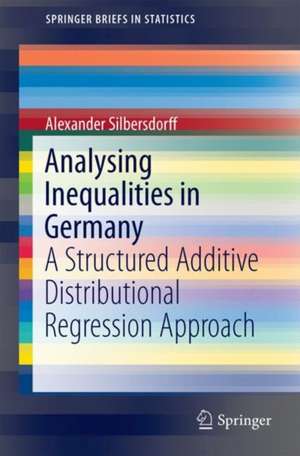Analysing Inequalities in Germany: A Structured Additive Distributional Regression Approach: SpringerBriefs in Statistics
Autor Alexander Silbersdorffen Limba Engleză Paperback – 5 oct 2017
This book seeks new perspectives on the growing inequalities that our societies face, putting forward Structured Additive Distributional Regression as a means of statistical analysis that circumvents the common problem of analytical reduction to simple point estimators. This new approach allows the observed discrepancy between the individuals’ realities and the abstract representation of those realities to be explicitly taken into consideration using the arithmetic mean alone. In turn, the method is applied to the question of economic inequality in Germany.
Din seria SpringerBriefs in Statistics
-
 Preț: 378.34 lei
Preț: 378.34 lei - 15%
 Preț: 459.93 lei
Preț: 459.93 lei - 17%
 Preț: 359.75 lei
Preț: 359.75 lei -
 Preț: 411.54 lei
Preț: 411.54 lei -
 Preț: 445.88 lei
Preț: 445.88 lei -
 Preț: 445.33 lei
Preț: 445.33 lei -
 Preț: 378.71 lei
Preț: 378.71 lei -
 Preț: 375.23 lei
Preț: 375.23 lei -
 Preț: 378.71 lei
Preț: 378.71 lei -
 Preț: 350.50 lei
Preț: 350.50 lei -
 Preț: 378.54 lei
Preț: 378.54 lei -
 Preț: 378.71 lei
Preț: 378.71 lei - 15%
 Preț: 461.73 lei
Preț: 461.73 lei -
 Preț: 352.28 lei
Preț: 352.28 lei -
 Preț: 378.54 lei
Preț: 378.54 lei -
 Preț: 377.73 lei
Preț: 377.73 lei - 5%
 Preț: 360.70 lei
Preț: 360.70 lei -
 Preț: 351.42 lei
Preț: 351.42 lei -
 Preț: 378.92 lei
Preț: 378.92 lei -
 Preț: 375.07 lei
Preț: 375.07 lei -
 Preț: 342.74 lei
Preț: 342.74 lei -
 Preț: 444.35 lei
Preț: 444.35 lei -
 Preț: 414.42 lei
Preț: 414.42 lei - 15%
 Preț: 462.70 lei
Preț: 462.70 lei -
 Preț: 378.54 lei
Preț: 378.54 lei -
 Preț: 378.12 lei
Preț: 378.12 lei -
 Preț: 271.46 lei
Preț: 271.46 lei -
 Preț: 347.71 lei
Preț: 347.71 lei -
 Preț: 377.73 lei
Preț: 377.73 lei -
 Preț: 270.74 lei
Preț: 270.74 lei -
 Preț: 378.54 lei
Preț: 378.54 lei - 5%
 Preț: 327.04 lei
Preț: 327.04 lei -
 Preț: 377.18 lei
Preț: 377.18 lei -
 Preț: 273.40 lei
Preț: 273.40 lei -
 Preț: 377.18 lei
Preț: 377.18 lei -
 Preț: 379.30 lei
Preț: 379.30 lei -
 Preț: 376.59 lei
Preț: 376.59 lei -
 Preț: 379.68 lei
Preț: 379.68 lei -
 Preț: 272.04 lei
Preț: 272.04 lei -
 Preț: 378.54 lei
Preț: 378.54 lei -
 Preț: 379.09 lei
Preț: 379.09 lei -
 Preț: 446.26 lei
Preț: 446.26 lei -
 Preț: 375.84 lei
Preț: 375.84 lei -
 Preț: 344.14 lei
Preț: 344.14 lei -
 Preț: 348.72 lei
Preț: 348.72 lei -
 Preț: 377.95 lei
Preț: 377.95 lei -
 Preț: 269.71 lei
Preț: 269.71 lei - 5%
 Preț: 361.06 lei
Preț: 361.06 lei -
 Preț: 375.84 lei
Preț: 375.84 lei -
 Preț: 442.62 lei
Preț: 442.62 lei
Preț: 377.35 lei
Nou
Puncte Express: 566
Preț estimativ în valută:
72.23€ • 78.48$ • 60.71£
72.23€ • 78.48$ • 60.71£
Carte tipărită la comandă
Livrare economică 21 aprilie-05 mai
Preluare comenzi: 021 569.72.76
Specificații
ISBN-13: 9783319653303
ISBN-10: 331965330X
Pagini: 98
Ilustrații: X, 98 p. 20 illus., 18 illus. in color.
Dimensiuni: 155 x 235 mm
Greutate: 0.16 kg
Ediția:1st ed. 2017
Editura: Springer International Publishing
Colecția Springer
Seria SpringerBriefs in Statistics
Locul publicării:Cham, Switzerland
ISBN-10: 331965330X
Pagini: 98
Ilustrații: X, 98 p. 20 illus., 18 illus. in color.
Dimensiuni: 155 x 235 mm
Greutate: 0.16 kg
Ediția:1st ed. 2017
Editura: Springer International Publishing
Colecția Springer
Seria SpringerBriefs in Statistics
Locul publicării:Cham, Switzerland
Cuprins
Preface.- Introduction.- Inequality and Earnings Distributions.- Estimating and Assessing Distributional Regression.- The Distributional Perspective and Labour Markets.- Applications of SADR in Economics.- Conclusion.- Index.
Notă biografică
Alexander Silbersdorff is a research associate at the Department of Statistics, University of Göttingen, Germany, where he predominantly works on the development and application of regression techniques to economic contexts. Previously, he served at the Department of Economic History at the University of Bielefeld, Germany, where he investigated the development of historical income structures.
Textul de pe ultima copertă
This book seeks new perspectives on the growing inequalities that our societies face, putting forward Structured Additive Distributional Regression as a means of statistical analysis that circumvents the common problem of analytical reduction to simple point estimators. This new approach allows the observed discrepancy between the individuals’ realities and the abstract representation of those realities to be explicitly taken into consideration using the arithmetic mean alone. In turn, the method is applied to the question of economic inequality in Germany.
Caracteristici
Explores the use of Structured Additive Distributional Regression to the analysis of economic inequality Introduces both Structured Additive Distributional Regression and inequality analysis Offers new lines of reasoning for a critical reflection on conventional economic theory Includes supplementary material: sn.pub/extras
